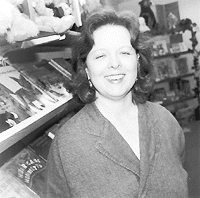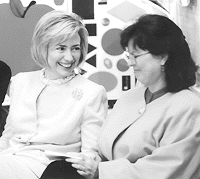https://www.austinchronicle.com/books/1998-05-29/523535/
The Genial General
ABA President Barbara Thomas Steps Down
By Lisa Tozzi, May 29, 1998, Books
|
|
Ask anyone about her - ABA colleague or Barnes & Noble manager - and they will utter the inevitable, the N-word: nice. It would be almost nauseating if they didn't mean it, but they do. And she is. Thomas' store reflects her personality, not at all sugary or condescending, but warm and welcoming. Painted characters from children's books dance along the walls of her office, an unlikely war room for a general on the front lines of independent bookstores' struggle for survival.
More June Cleaver than George Patton, it is precisely Thomas' blend of kindness and conviction that effectively shepherded the diverse group of nearly 4,000 ABA members through two rocky years of battle, say colleagues. Thomas will end her two-year tenure by passing the proverbial presidential baton to Richard Howorth, owner of renowned Square Books, in Oxford, Mississippi. "She has brought a lot of trust and understanding to the board and has been able to pull everyone in the same direction," says Howorth. "She is a great communicator, who deliberates carefully over every decision and seeks counsel from others. I have learned a lot from working with Barbara."
But with Thomas stepping down, the struggle of independent bookstores is far from over. Throughout the nation, more and more independents are being squeezed out of business, says Thomas, with the result that independents are unable to compete with chains like Barnes & Noble and Borders, which have a combined national count of over 2,000 stores and together represent approximately $5 billion in sales. (In contrast, ABA members, which include independents, specialty, franchise, smaller chains, and college and university stores, generate $9 billion in U.S. sales combined, according to the organization.) Though there is little anyone can do if a chain wants to open up across the street from an independent bookstore, over the past few years the ABA has stepped up its salvaging efforts, initiating litigation to ensure that the chains are not receiving deals or discounts that unfairly bolster their businesses. During Thomas' tenure, the ABA has settled lawsuits with six of the country's major publishers - including a $25 million settlement with Penguin Putnam Inc., believed to be the largest settlement in the history of U.S. antitrust discrimination law.
In March, the ABA filed another antitrust suit - this time against the big chains - Barnes & Noble and Borders - charging that they are soliciting and receiving illegal terms of sale discounts, better payment terms, better return policies, and other deals from publishers that are pricing ABA members out of business in violation of the 1936 Robinson-Patman Act and two California antitrust statutes. In addition to the legal actions, during Thomas' watch the ABA adopted a health and liability insurance program, negotiated with shipping companies, telephone, and credit card companies for better rates for members, sold the annual ABA trade show to an outside company, and oversaw the appointment of a new executive director after the group's longtime director stepped down.
"She has led us through a very difficult time with a dignity and grace that is incredible," says Avin Mark Domnitz, executive director of the ABA and longtime co-owner of Harry W. Schwartz Bookshops in Milwaukee. "It's incredibly difficult because everything you do, half the people don't like it." Domnitz says that Thomas has effectively unified the group. "Right now most of the members seem to be on the same page."
As the owner of Toad Hall for the past 20 years, Thomas is all too familiar with the daily struggle of the independent bookstore. Once upon a time, the former teacher and school librarian used her retirement money and a small bank loan to open a children's bookstore named for the fictional manor in the classic Wind in the Willows. "I knew it would be a challenge," said Thomas. "But I thought, somewhat naïvely, that it would be fun." When she first opened Toad Hall on Far West Boulevard, the book market was vastly different, still seen as more of an artistic endeavor than a business. A store dedicated to children's books - or any other specialty - was a rarity; the boom in children's publishing and the domination of massive book superstores was a few years away, says Thomas. "When I first opened it was unusual to have a store dedicated to children's books. We weren't the first, but we were an oddity."
|
|
But booksellers are hopeful that the ABA's suit will at least make the fight fair. While independents do not have the resources of chains, booksellers in Austin and around the country expressed the feeling that if they work together, they can make sure that the chains do not get concessions like discounts and more time to pay bills that are kept from the smaller stores and therefore drive them out of business. They are steadfast in their conviction that a world dominated by one or two chain stores is not good for readers or for writers and though the legal battle is difficult, it is necessary. "We definitely saw improvements after the settlement with the publishers, no doubt about it," remarks Susanna Nawrocki, manager of San Antonio's Twig Books, one of 26 plaintiffs named in the suit against the chains. "We hope this action will be another step toward leveling the playing field. The giants are demanding and getting concessions that are not legal and not given to independent retailers."
But even in the frustrating fight, Thomas has a clarity of vision that allows her to see a common ground that independents, chains, and book publishers share, a common ground she believes will eventually prove stronger than their differences. She doesn't see the industry in terms of bad guys and good guys but rather as people who share an honorable vision that binds them: the desire for a literate society. "The book business is somewhat strange in that everyone - retailers, authors, publishers - all have this common goal of wanting to get more books into more people's hands," says Thomas. "We all have the same goal of making sure reading is a viable leisure activity. That's the nice part of the business." It is that attitude that has garnered her raves from her peers in the ABA, who praise Thomas' ability to be strong without being strident and to unify the troops in a brazenly volatile period.
When the ABA conference ends Sunday, Thomas will return to Austin a bit less frantic. While she has enjoyed her tenure on the board, she is palpably relieved to relinquish her spot on the front lines and concentrate on the more serene world of Toad Hall. Slowly, the two worlds will start to merge: no more jetting off for press conferences, no more calls from frantic booksellers and angry publishers. Still, Thomas knows better than anyone that the life of a small bookstore owner is not all sing-a-longs and storytimes. "It's been a good two years, but it's been a pretty intense time," she said, grinning at the obvious understatement. "I'm looking forward to being back in the bookstore."
Copyright © 2024 Austin Chronicle Corporation. All rights reserved.


